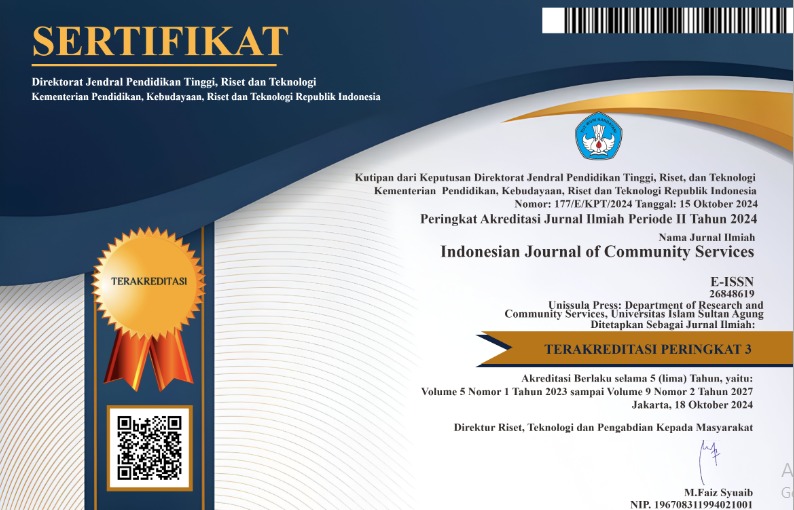Meningkatkan Kemampuan Vocabulary Siswa ECC SMA N Kaliwungu melalui Kompetisi Interaktif dengan Aplikasi Bamboozle
Abstract
Penguasaan kosakata merupakan aspek fundamental dalam pembelajaran bahasa Inggris sebagai bahasa asing (EFL), namun seringkali dihadapkan pada tantangan seperti rendahnya motivasi belajar dan kurangnya strategi pembelajaran yang menarik. Penelitian ini bertujuan untuk meningkatkan kemampuan kosakata siswa SMA N 1 Kaliwungu melalui pendekatan interaktif berbasis teknologi dengan menggunakan aplikasi Bamboozle. Metode yang digunakan melibatkan kompetisi tim berbasis permainan edukatif, di mana siswa dibagi menjadi dua kelompok untuk saling berkompetisi menjawab pertanyaan terkait kosakata. Kegiatan ini melibatkan siswa kelas 10 dan 11 yang tergabung dalam English Conversation Club (ECC). Hasil penelitian menunjukkan bahwa penggunaan Bamboozle berhasil meningkatkan motivasi dan antusiasme siswa dalam belajar kosakata. Siswa menjadi lebih aktif, kolaboratif, dan percaya diri dalam menggunakan kosakata baru dalam percakapan sehari-hari. Selain itu, 85% siswa menyatakan merasa lebih termotivasi, dan 78% siswa mengaku lebih mudah mengingat kosakata baru melalui metode ini. Implikasi dari penelitian ini adalah bahwa pendekatan pembelajaran interaktif berbasis teknologi seperti Bamboozle dapat menjadi solusi efektif untuk meningkatkan penguasaan kosakata dan keterlibatan siswa dalam pembelajaran bahasa Inggris.
Vocabulary mastery is a fundamental aspect of learning English as a foreign language (EFL), yet it often faces challenges such as low motivation and a lack of engaging learning strategies. This study aims to enhance the vocabulary skills of students at SMA N 1 Kaliwungu through an interactive, technology-based approach using the Bamboozle application. The method involves team-based educational games, where students were divided into two groups to compete in answering vocabulary-related questions. The activity involved 10th and 11th-grade students who are members of the English Conversation Club (ECC). The results showed that the use of Bamboozle successfully increased students' motivation and enthusiasm in learning vocabulary. Students became more active, collaborative, and confident in using new vocabulary in everyday conversations. Additionally, 85% of students reported feeling more motivated, and 78% found it easier to remember new vocabulary through this method. The implication of this study is that interactive, technology-based learning approaches like Bamboozle can be an effective solution for improving vocabulary mastery and student engagement in EFL learning.
Keywords
Full Text:
PDFReferences
Ahmadi, M. R., Ismail, H. N., & Kabilan, M. K. (2012). Improving Vocabulary Learning in Foreign Language Learning Through Reciprocal Teaching Strategy. International Journal of Learning and Development, 2(6), 186. https://doi.org/10.5296/ijld.v2i6.2882
Alabbad, A. M., & Huwamel, H. S. B. (2020). The Effect of Using Padlet as a Vocabulary Knowledge Enhancement Application on Saudi EFL Female Learners, and Their Attitudes Toward Its Value in Learning. https://doi.org/10.31235/osf.io/fgcru
Aprilani, D. N., & Suryaman, M. (2021). Students’ Perception in Learning English Vocabulary Through Quizlet. Jet (Journal of English Teaching), 7(3), 343–353. https://doi.org/10.33541/jet.v7i3.3064
Ayong, D. M. (2024). Grade 12 Senior High School Students’ Efficiency in Vocabulary Building via Interactive Digital Tool (VERBAID). International Journal of English Literature and Social Sciences, 9(2), 153–160. https://doi.org/10.22161/ijels.92.23
Chow, B. W., Hui, A. N. N., Li, Z. J., & Dong, Y. (2021). Dialogic Teaching in English-as-a-Second-Language Classroom: Its Effects on First Graders With Different Levels of Vocabulary Knowledge. Language Teaching Research, 27(6), 1408–1430. https://doi.org/10.1177/1362168820981399
Dewi, N. P. D. (2023). Wordy Wordy Card for an Innovative Teaching Method for Learning English. Indonesian Journal of Educational Development (Ijed), 4(2), 184–193. https://doi.org/10.59672/ijed.v4i2.2823
Elaish, M. M., Ghani, N. A., Shuib, L., & Al-Haiqi, A. (2019). Development of a Mobile Game Application to Boost Students’ Motivation in Learning English Vocabulary. IEEE Access, 7, 13326–13337. https://doi.org/10.1109/ACCESS.2019.2891504
Keskin, D. (2023). Implementation of Flipped Model in Efl Reading Classrooms. Turkish Online Journal of Distance Education, 24(3), 261–279. https://doi.org/10.17718/tojde.1132888
Maming, K., Sani, A., Putra, D. P., & Radiana, S. P. (2023). Get Ahead With Quizizz: Advancing Junior High School Students’ Vocabulary Mastery in Online Learning. Elsya Journal of English Language Studies, 5(2), 224–235. https://doi.org/10.31849/elsya.v5i2.10275
Palandi, J. F. (2024). Enhancing English Vocabulary Through Game-Based Learning: A Case Study of the Scramword Application. International Journal in Information Technology in Governance Education and Business, 6(1), 109–121. https://doi.org/10.32664/ijitgeb.v6i1.141
Saputra, A. D., Septiani, L., Adriani, R., & Sundari, H. (2021). Game-Based English Learning for Young Learners: A Systematic Review. JEdu: Journal of English Education, 1(3), 109–122. https://doi.org/10.30998/jedu.v1i3.4752
Saud, S., Aeni, N., & Azizah, L. (2022). Leveraging Bamboozles and Quizziz to Engage EFL Students in Online Classes. International Journal of Language Education, 6(2), 169–182. https://doi.org/10.26858/ijole.v6i2.24301
Tong, M., & Gao, T. (2022). For Sustainable Career Development: Framework and Assessment of the Employability of Business English Graduates. Frontiers in Psychology, 13. https://doi.org/10.3389/fpsyg.2022.847247
Yudintseva, A. (2015). Game-Enhanced Second Language Vocabulary Acquisition Strategies: A Systematic Review. Open Journal of Social Sciences, 03(10), 101–109. https://doi.org/10.4236/jss.2015.310015
DOI: https://dx.doi.org/10.30659/ijocs.7.1.52-59
Refbacks
- There are currently no refbacks.
Copyright (c) 2025 Muhamad Rifqi Bakhtiar, Ifan Rikhza Auladi

This work is licensed under a Creative Commons Attribution 4.0 International License.

